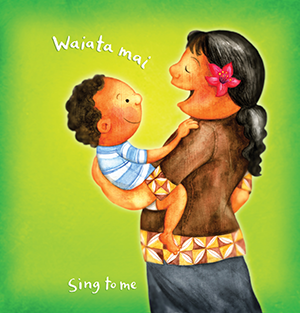
Music and movement
Most children love music. Singing and dancing are fun and create a happy atmosphere. They are great ways to connect with tamariki and help with their development.
A newborn emerges from a world of sound and rhythm, so it’s no wonder that babies and young children seem to naturally enjoy music and songs. Many parents rock, hum or sing with their babies to help calm, settle or entertain them.
Music is fun, and it enhances many skills that support further learning, including concentration, confidence, and cognitive and memory skills. It strengthens neural pathways for physical coordination, speaking and listening, and emotional wellbeing.
The benefits of music and movement
There are many benefits when children and whānau enjoy musical experiences like singing, dancing, learning rhymes and doing finger plays together.
- Music and singing help a child to stay focused and improves their listening skills.
- Music encourages balance, movement and coordination, which is great for perfecting motor skills.
- Repetition of lyrics is great for encouraging language development. We need to repeat words in order to learn.
- Sharing dance, song, and swaying with children helps with bonding and can help with expressing feelings.
- Rhythm and music help children memorise patterns, which helps with maths and reading later on. Clapping games, stamping and clicking are all good counting and rhythm activities.
- Music brings people in touch with their culture and can be a social activity for families, communities and churches.
- Music combines many aspects of development at one time – language, movement, listening, voice and communication.
- Music encourages creativity – have you had a go at making up songs?
- Music lends itself to using musical instruments, natural resources and voices. We can all be musicians.
Try an activity
Action songs
A song with actions and words is a rich, multi-sensory learning and brain-building experience for baby. They're a fun way for children to learn through repetition.
How to encourage enjoyment of music
The best way to encourage children to enjoy musical activities is to join in with them. Passive listening to music, for example, when travelling in the car, has its place, but there is nothing better for a toddler than being actively involved. Here are some simple ways to do that.
Join a group
Singing and dancing or exploring musical instruments with others is the best experience for tamariki. Most communities have music and movement groups, which are a great way to get toddlers involved, especially if whānau struggle with creating musical fun and games at home.
Encourage tapping and banging
Children enjoy real instruments like maracas, drums, cymbals and bells. Homemade instruments provide heaps of pleasure too. Give them poi or rhythm sticks, or pots and pans and a couple of wooden spoons, and tamariki will immediately begin some type of rhythm making. Tapping and banging gives them opportunities to discover and develop different ways to be creative and expressive.
Sing with them
Music and singing expose tamariki to a wider world of other languages and cultures, instruments, dances and movement. Learning to follow a song establishes the building blocks for other types of learning, especially if actions are added. For example, recognising same and different, and identifying the repeating patterns involved in songs and rhymes, are early reading and maths skills.
Songs and rhymes provide children with easy ways to communicate and help create a happy, relaxed atmosphere. Making up silly songs with repetitive rhythms or words is heaps of fun and will enhance language development.
Not all parents feel comfortable singing, but their children won’t care what they sound like – they want to do anything their whānau are doing, especially when they look like they’re having fun!
Toddlers tend to have favourite songs or rhymes and may request them over and over again, just like they have their favourite books. This urge for repetition strengthens brain connections, so encourage it.
Conversation ideas
Helpful resources for whānau
-
Play ideas and activities
Ministry of Education
These play ideas from the Ministry of Education were developed for playgroups, but parents and caregivers may also find the ideas useful.
-
Tātai Kōrero – waiata<
Tātai Kōrero – waiataMāori whānau talk about the benefits waiata can bring to the lives of mokopuna by promoting all areas of their development and wellbeing.
-
Tātai Kōrero – waiata (te reo Māori)<
Tātai Kōrero – waiata (te reo Māori)Māori whānau talk about the benefits waiata can bring to the lives of mokopuna by promoting all areas of their development and wellbeing.












